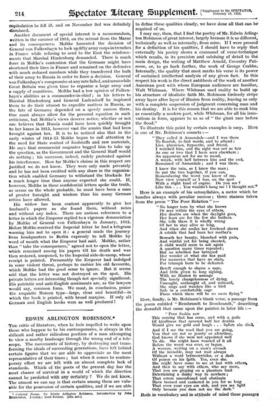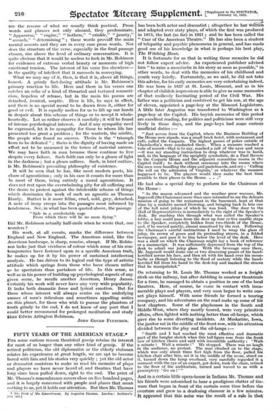EDWIN ARLINGTON ROBINSON.* Tuz critic of literature, when he feels
impelled to write upon those who happen to be his contemporaries, is always in the difficult and rather ridiculous position of a man attempting to view a nearby landscape through the wrong end of a tele- scope. The movements of history, by destroying and trans- forming the ideals of succeeding generations, have left behind certain figures that we are able to appreciate as the most representative of their times ; but when it comes to contem- porary effort we are left with an almost complete lack of standards. Which of the poets of the present day has the most chance of survival in a world of which the direction cannot be predicted with any certainty ? We do not know. The utmost we can say is that certain among them are valu- able for the possession of certain qualities, and if we are able • Colleded Poems. By Edwin Arlington Robinson. Introduction by John DT Inkwater, London: Cecil Palmer. 1,21s. net.1
to define these qualities dearly, we have done all that can be required of us.
I may say, then, that I find the poetry of Mr. Edwin Arling- ton Robinson of great interest, largely becauie it is so different, technically as well as internally, from mine. If I were pressed for a definition of his qualities, I should have to reply that externally his poetry shows a command of verse-technique which recalls, in its precision and subduing of detail to the main design, the writing of Matthew Arnold, Coventry Pat- more, or, to go back further, the work of George Crabbe. Internally, the quality that most marks his verse is its power of sustained intellectual analysis of any given fact. In this respect his work is the direct antithesis of the work of another American poet with whom European audiences are familiar, Walt Whitman. Where Whitman used reality to build up his structure of idealistic faith Mr. Robinson tirelessly strips away layer after layer of illusion from reality, leaving us only with a complete suspension of judgment concerning man and his destiny. It is for this reason that we are able to rank him as essentially a modern poet, while Whitman, for all his inno- vations in form, appears to us as of " the giant race before the flood."
To illustrate this point by certain examples is easy. Here is one of Mr. Robinson's sonnets :- " They called it Annandale—and I was there To flourish, to find words, and to attend : Liar, physician, hypocrite, and friend, I watched him, and the sight was not so' fair As one or two that I have seen elsewhere : An apparatus not for me to mend, A wreck, with hell between him and the end, Remained of Annandale ; and I was there.
I knew the ruin, as I knew the man ; So put the two together, if you can, Remembering the worst you know of me. Now view yourself as I was, on the spot With a slight kind of engine. Do you see ? Like this . . . You wouldn't hang me ? I thought not.'
Here is an example of his octosyllabics, a metre which he handles always with peculiar success ; three stanzas taken from the poem " The Poor Relation " :- " No longer torn by what she knows Or sees within the eyes of others, Her doubts are when the daylight goes, Her fears are for the few she bothers. She tells them it is wholly wrong Of her to stay alive so long, And when she smiles her forehead shows A crinkle that had been her mother's.
Beneath her beauty, blanched with pain, And wistful yet for being cheated, A child would seem to ask again
A question many times repeated ;
But no rebellion has betrayed Her wonder at what she has paid For memories that have no stain, For triumph born to be defeated.
Bereft enough to shame a sage, And little given to long sighing, With no illusion to assuage The lonely changelessness of dying, Unsought, unthought of, and unheard, She sings and watches like a bird Safe in a comfortable cage From which there will be no more flying."
Here, finally, is Mr. Robinson's blank verse, a passage from the poem entitled " Rembrandt to Rembrandt," describing the downfall that came upon the painter- in later life :— " Poor Saskia saw This coming that has come, and with a guile Of kindliness that covered half her doubts Would give me gold and laugh . . . Wore she died, And if I see the road that you are going, You that are not so jaunty as aforetime, God knows if she were not appointed well To die. She might have wearied of it all Before the worst was over, or begun. A woman, waiting on a man's avouch Of the invisible, may not wait always Without a word betweenwhiles, or a dash Of poison on his fitith. Yes, even she.
She might have come to see at last with others*
And then to say with others, who say more, That you are groping on a phantom trail Determining a dusky way to nowhere ; That errors unconfessed and obstinate Have teemed and cankered in you for so long That even your eyes are sick, and you see light Only because you dare not see the dark."
Both in vocabulary and in attitude of mind these passages
are the reverse of what we usually think poetical. Prose words and phrases not °fay abound, they predominate. " Apparatus," " engine," " bothers," " crinkle," " jaunty," " avouch," " determining " ; these words provide the main mental accents and they are in every case prose words. Nor does the structure of the verse, especially in the final passage chosen, rise above the level of ordiniry conversation. It is quite obvious that it would be useless to look in Mr. Robinson for evidences of extreme verbal beauty or moments of high emotional tension. The interest of his verse lies elsewhere— in the quality of intellect that it succeeds in conveying.
What we may say of it, then, is that it is, above all things, honest. A grimly fact-facing attitude is Mr. Robinson's primary reaction to life. Here and there in his verses one catches an echo of a kind of thwarted and tortured romanti- cism, hopeless of release, but in the main his poems are detached, ironical, sceptic. Here is life, he says in effect, and there is no special moral to be drawn from it, either for good or evil. It is equally useless for us to lift up our hands in despair about this scheme of things or to accept it whole- heartedly. Let us rather observe it carefully; it will be found of intense psychological interest. And if any sympathy need be expressed, let it be sympathy for those to whom life has presented too great a problem ; for the wastrels, the misfits, the people who found no success. Theirs is the " triumph born to be defeated " ; theirs is the dignity of having made an effort not to be measured in the terms of material success. We may have faith in man because these continue to live despite every failure. Such faith can only be a gleam of light in the darkness ; but a gleam suffices. Such, in brief outline, is Mr. Robinson's prevailing philosophy of existence.
It will be seen that he has, like most modern poets, his share of agnosticism ; only in his case it counts for more than in most of them, being entirely a moral agnosticism. It does not rest upon the overwhelming pity for all suffering and the desire to protest against the intolerable scheme of things which dominates the work of such an agnostic as Thomas Hardy. Rather is it more feline, cruel, cold, grey, detached. A note of irony creeps into the passages most informed by tenderness. See, in what has been quoted above, the passage " Safe in a comfortable cage
From which there will be no more flying."
Did Mr. Robinson actually half-smile when he wrote that, one wonders ?
His work, at all events, marks the difference between England and New England. The American mind, like the American landscape, is sharp, concise, abrupt. If Mr. Robin- son lacks just that vividness of colour which some of his cod- temporaries have fastened upon as a specific American trait, be makes up for it by his power of sustained intellectual analysis. He has driven to its logical end the type of artistic attitude which springs from those who have chosen rather to be spectators than partakers of life. In this sense, as well as in his power of building up psychological aspects of any given scene, he recalls another American, Henry James. Certainly his work will never have any very wide popularity. It lacks both dramatic force and lyrical emotion. But for those whose interest will always centre on the underlying causes of man's ridiculous and sometimes appalling antics on this planet, for those who wish to pursue the phantom of truth grimly to the end, I do not know of any poet that I could better recommend for prolonged meditation and study than Edwin Arlington Robinson.
Jou): GOULD FLETCHER.



































































 Previous page
Previous page